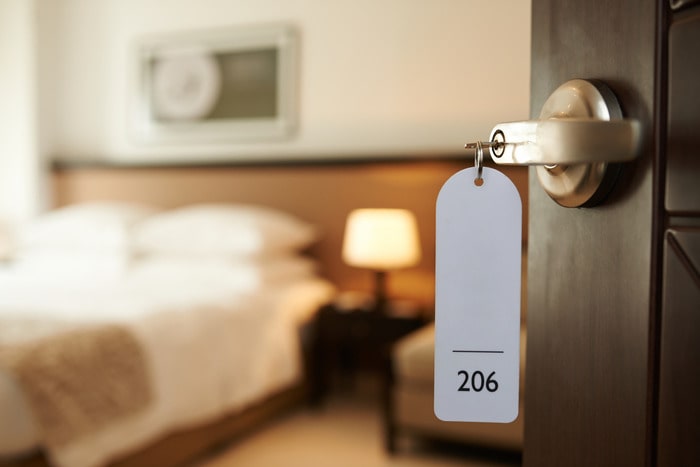
- August 6, 2023
- |security guard company
- | 0
An Approach to Guest Safety –
In the world of hospitality, the safety and security of guests are paramount. As a leading hotel security company, XPressGuards recognizes that providing a secure environment is essential for creating a positive guest experience. This article delves into the multifaceted strategies and technologies that hotels employ to ensure the safety and security of their guests, fostering a sense of tranquility and comfort during their stay.
1. Trained and Vigilant Staff
A crucial element of guest safety is the presence of trained and vigilant staff members. Hotels invest in comprehensive training programs for their personnel, covering topics such as emergency response protocols, conflict resolution, and identifying suspicious activities. Well-trained staff members are equipped to handle a range of situations professionally and effectively, ensuring the well-being of guests at all times.
2. Access Control and Surveillance
Modern hotels utilize access control systems and surveillance technology to safeguard their premises. Access control systems restrict entry to authorized areas, such as guest rooms, staff-only sections, and elevators, using keycards, biometric identification, or secure codes. Surveillance cameras placed strategically in public areas, hallways, entrances, and parking lots provide constant monitoring, deterring potential threats and capturing evidence in case of incidents.
3. Emergency Response Plans
Hotels develop and regularly update comprehensive emergency response plans that outline procedures for various scenarios, including fires, natural disasters, medical emergencies, and security breaches. These plans include evacuation routes, assembly points, communication protocols, and roles for staff members during emergencies. Regular drills and simulations ensure that staff members are well-prepared to respond swiftly and effectively.
4. Guest Room Security
Guest room security is a priority for hotels. Locks, peepholes, and chain locks provide guests with control over who enters their rooms. Additionally, electronic safes are often provided for guests to secure their valuables. Regular maintenance and testing of locks and security features ensure that they function as intended, preventing unauthorized access.
5. Visible Security Measures
Visible security measures, such as uniformed security personnel, help deter potential threats and reassure guests of their safety. Trained security officers stationed at entrances, lobbies, and other key areas can quickly respond to emergencies, disturbances, or suspicious activities. Their presence alone can discourage individuals with ill intentions.
6. Collaborations with Local Law Enforcement
Hotels often establish partnerships with local law enforcement agencies to enhance guest safety. This collaboration can involve sharing information about local crime trends, conducting joint training sessions, and having a direct line of communication for swift responses to emergencies. Law enforcement agencies can provide valuable guidance on security best practices and offer assistance during critical situations.
7. Security Audits and Assessments
Regular security audits and assessments are integral to identifying vulnerabilities and gaps in the hotel’s security infrastructure. Independent security experts or consultants can evaluate the hotel’s physical security, cybersecurity measures, and overall safety protocols. These audits provide valuable insights that enable hotels to enhance their security measures and ensure compliance with industry standards.
8. Cybersecurity Measures
In the digital age, cybersecurity is essential for protecting guests’ personal and financial information. Hotels must implement robust cybersecurity measures to prevent data breaches and protect guest data. These measures include secure Wi-Fi networks, encryption, firewall protection, and regular software updates to mitigate the risk of cyberattacks.
9. Guest Screening and Identity Verification
Hotels employ guest screening and identity verification processes to ensure the safety of all occupants. This involves verifying guests’ identities upon check-in and monitoring for any suspicious behavior. Some hotels also require guests to present a valid photo ID and credit card matching the reservation details.
10. Collaborative Training and Communication
Creating a culture of safety involves training not only the hotel staff but also guests. Many hotels provide informational materials in guest rooms that outline safety measures, emergency exit routes, and contact information for the front desk and emergency services. These materials empower guests to take an active role in their own safety.
11. Wellness and Mental Health Support
Ensuring guest safety extends beyond physical security to emotional and mental well-being. Hotels offer support services and resources for guests who may be experiencing stress or emotional distress. Trained staff members can provide assistance, guidance, and referrals to appropriate resources when needed.
12. Guest Feedback and Continuous Improvement
Listening to guest feedback is crucial for refining safety and security measures. Hotels often encourage guests to provide feedback on their experiences, including their perceptions of safety. This feedback helps hotels identify areas for improvement, adapt to changing needs, and enhance their overall security strategies.
The safety and security of guests are non-negotiable priorities for hotels seeking to provide exceptional hospitality experiences. By combining trained staff, cutting-edge technologies, emergency response plans, and a commitment to continuous improvement, hotels can ensure that their guests enjoy a safe, comfortable, and worry-free stay.
As a dedicated hotel security company, XPressGuards is dedicated to partnering with hotels to implement comprehensive security solutions that uphold the highest standards of guest safety, contributing to the industry’s reputation for delivering memorable and secure experiences. Contact us to learn more.


